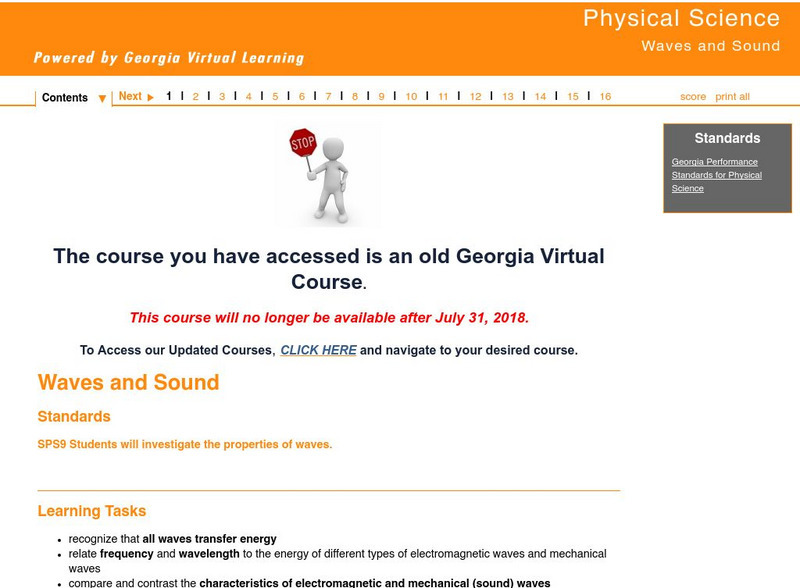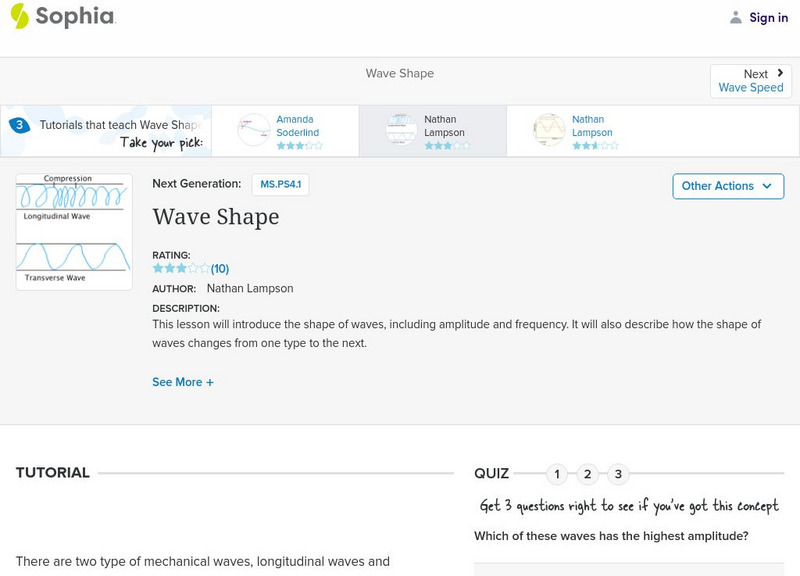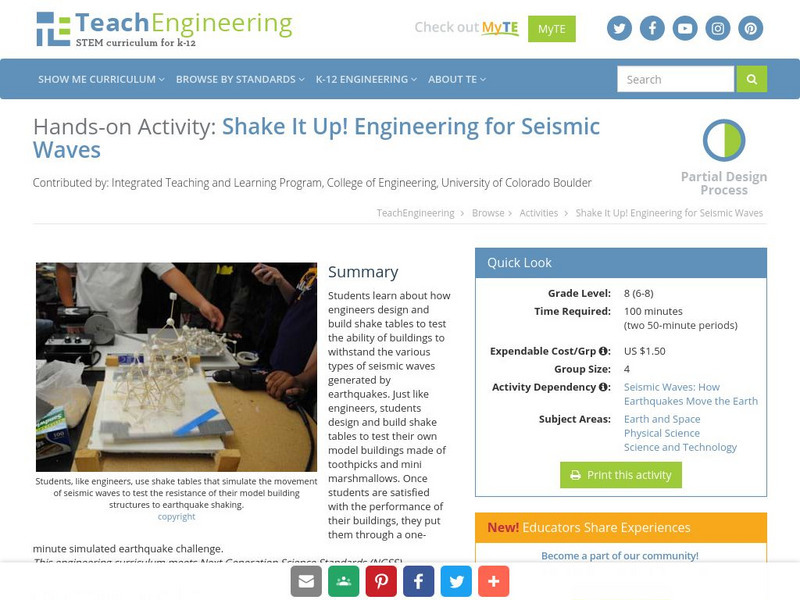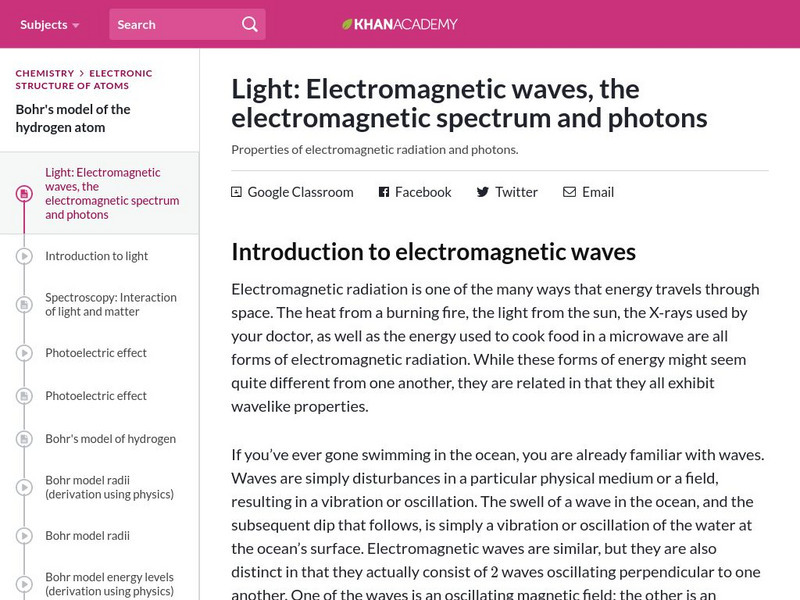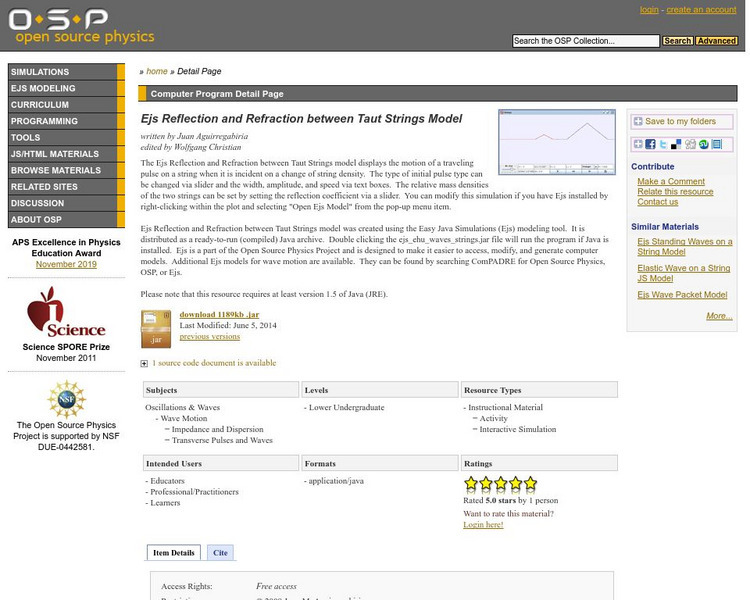PBS
Pbs Learning Media: What Is a Wave?
This interactive activity adapted from the University of Utah's ASPIRE Lab provides an overview of the characteristics and properties of various types of waves, including light waves, sound waves, and water waves.
CK-12 Foundation
Ck 12: Plix: Types of Waves: Mechanical Wave
[Free Registration/Login Required] Move the points to change the frequency and amplitude of the waves while making the waves transverse or longitudinal according to the labels.
TeachEngineering
Teach Engineering: Waves and Wave Properties
Students learn about the types of waves and how they change direction, as well as basic wave properties such as wavelength, frequency, amplitude and speed. During the presentation of lecture information on wave characteristics and...
Georgia Department of Education
Ga Virtual Learning: Physical Science: Waves and Sound
In this module, students investigate the properties and behavior of different types of waves.
BBC
Bbc: Gcse Bitesize: General Properties of Waves
Light travels as waves. Waves can be described by their amplitude, wavelength and frequency. The speed of a wave can be calculated from its frequency and wavelength.
University of Colorado
University of Colorado: Ph Et Interactive Simulations: Wave Interference
Conduct virtual experiments with water, sound, and light waves to determine the sine wave and patterns created in each.
BBC
Bbc: Gcse Bitesize: Why Do Scientists Think That Light and Sound Are Waves?
Light travels as transverse waves and can travel through a vacuum. Sound travels as longitudinal waves and needs to travel through a solid, liquid or gas. Read about the properties of light and of sound, and learn the differences between...
TeachEngineering
Teach Engineering: Seismic Waves: How Earthquakes Move the Earth
Middle schoolers learn about the types of seismic waves produced by earthquakes and how they move the Earth. The dangers of earthquakes are presented as well as the necessity for engineers to design structures for earthquake-prone areas...
CK-12 Foundation
Ck 12: Earth Science: Wind Waves
[Free Registration/Login may be required to access all resource tools.] How winds form ocean waves.
Center of Science and Industry
Cosi Columbus: Big Wave
Investigate the behavior of a string of rubber bands and clips, and discover why it produces patterns of movement called waves. Includes full list of materials, procedures, and scientific explanation of what causes different types of waves.
University of Colorado
University of Colorado: Ph Et Interactive Simulations: Wave on a String
Students can observe the properties of a wave with different variables. Students can experiment with the type of end, damping factor, and tension in the string. Possible teacher lesson plans are included at the bottom of the page.
CK-12 Foundation
Ck 12: Physical Science: Mechanical Wave
[Free Registration/Login may be required to access all resource tools.] What a mechanical wave is and what it travels through, and different types of mechanical waves.
Soft Schools
Soft Schools: Waves
Take an interactive quiz over energy waves. After completing the quiz, check your score, and then revisit any incorrect question for further review.
Physics Classroom
The Physics Classroom: Waves, Sound and Light: Longitudinal Pulse
The animation portrays a medium as a series of particles connected by springs. In this type of longitudinal wave the particles of the medium vibrate in a direction parallel to the direction of energy transport.
Sophia Learning
Sophia: Wave Shape: Lesson 5
This lesson will introduce the shape of waves, including amplitude and frequency. It will also describe how the shape of waves changes from one type to the next. It is 5 of 5 in the series titled "Wave Shape."
TeachEngineering
Teach Engineering: Shake It Up! Engineering for Seismic Waves
Students learn about how engineers design and build shake tables to test the ability of buildings to withstand the various types of seismic waves generated by earthquakes. Just like engineers, students design and build shake tables to...
Creative Science Centre
Creative Science Centre: Wind and Wave and Other Power
A collection of links to projects and information on how to make different types of windmills, and a wave powered electricity generator.
TeachEngineering
Teach Engineering: Measuring Distance With Sound Waves
Students learn about sound waves and use them to measure distances between objects. They explore how engineers incorporate ultrasound waves into medical sonogram devices and ocean sonar equipment. Students learn about properties, sources...
Khan Academy
Khan Academy: Electromagnetic Waves: The Electromagnetic Spectrum and Photons
An article that discusses the coupling of an electric field with a magnetic field to create electromagnetic waves. Article also discusses how different types of electromagnetic waves have different wavelengths which forms the...
American Association of Physics Teachers
Com Padre Digital Library: Open Source Physics: Ejs Reflection and Refraction Between Taut Strings Model
In this simulation, two strings with different densities are held tautly as a wave pulses along them. Variables can be changed to alter the relative densities of the strings, as well as the type of wave pulse.
Khan Academy
Khan Academy: The Effects of Ultrasound on Different Tissue Types
This is a five-question quiz related to the passage "The Effects of Ultrasound on Different Tissue Types."
Other
Nevada Seismological Laboratory: Seismic Waves
This resource describes the two different types of seismic waves and how they travel through the earth, offers diagrams of the waves, their speeds, and how seismograms are used to locate earthquakes.
TeachEngineering
Teach Engineering: Exploring the Electromagnetic Spectrum
Students learn the basics of the electromagnetic spectrum and how various types of electromagnetic waves are related in terms of wavelength and energy. In addition, they are introduced to the various types of waves that make up the...
Ducksters
Ducksters: Physics for Kids: Types of Electromagnetic Waves
Kids learn about the types of electromagnetic waves in the science of physics including microwaves, infrared, ultraviolet, radio, x-rays, and gamma rays.



